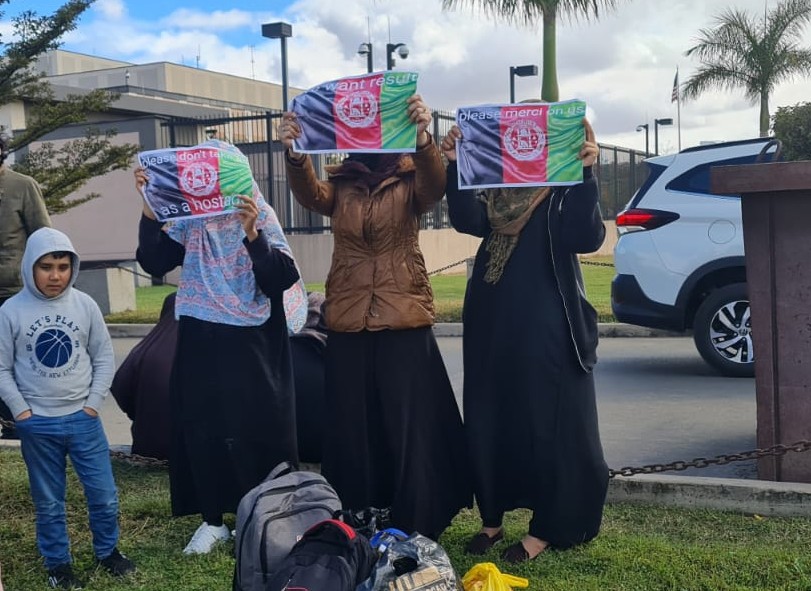Afghan refugees protest delayed visas at US embassy in Madagascar

Afghan refugees living in the east African island nation say they lack basic support and want to be relocated to the US.
A group of refugees from Afghanistan has gathered in front of the United States embassy in Madagascar’s capital, Antananarivo, calling for their cases to be expedited after years of waiting.
At least a dozen Afghans including both adults and children gathered on Monday outside the embassy premises, saying they had applied for the US Refugee Admissions Program in 2019, but were yet to receive any updates until two months ago, when they had interviews with a US Citizenship and Immigration Services (USCIS) agent.
Since then, their wait for answers has continued, they said.
“They said after one month they give us the result, after now they haven’t given the result,” claimed one refugee, Ahmadullah, who like the others gathered asked to only use his first name for fear of retribution against his family in Afghanistan.
“We have no word,” he told Al Jazeera. “We have nothing.”
Bahar, a spokesman for the group, told Al Jazeera by video chat from the protest “They make us a hostage since 2019 … Now we are sitting here in this rain. We will not leave until we get this answer.”
Those gathered said they had worked in support of either NATO forces or US and foreign companies and non-profits in Afghanistan, and as a result, faced Taliban retribution if they returned to their home country.
Bahar, a former IT manager at the Afghan central bank, told Al Jazeera that he had previously worked with the US Agency for International Development (USAID) and his family had provided land and support to US-based NGO Morning Star in their home village of Jegdalek. He fled to Madagascar in 2018 after his mother was killed in a Taliban attack.
Another woman who sat in front of the embassy, Bibi Maria, said she fled Afghanistan that same year with her four children after the Taliban killed her husband, who she said was a supplier for US and NATO troops.
Some of those gathered carried signs with Afghan flags that said “please merci [sic] on us” and “we want results”.
With few options for travel available, the fleeing Afghans said they had chosen Madagascar because they could get a visa on arrival.
As of April, there were 20 United Nations-registered Afghan refugees in the country, according to the UN High Commissioner for Refugees (UNHCR). While the refugees receive some basic support through a local UNHCR-affiliated organisation, they are unable to work, and they say their children are unable to go to school and that access to healthcare remains severely limited.
The UN has said that while Madagascar offers refugees and asylum seekers protection from expulsion or forced return to their home countries, it has no law to provide them with social support, work authorisation, or healthcare.
Meanwhile, the island nation’s economy has struggled amid the coronavirus pandemic. About 77 percent of the population lives in poverty, which is compounded by regular natural disasters.
“We don’t have anything now,” Bibi Maria said through a translator. “No money. My children are sick. Where do we go?”
Relocation backlogs
The protest comes as the US has faced a tidal wave of Afghan refugees seeking entry into the country since the Taliban took control of Afghanistan in August 2021 amid the withdrawal of the US and other NATO forces stationed there.
But there are backlogs of applicants in programmes to relocate Afghan refugees to the US, partly because of the pandemic and also due to Ukrainians fleeing Russia’s invasion of their country.
One programme offers special immigrant visas (SIVs) to Afghans who worked directly for the US government or for companies that contracted with the US government, but is notorious for having a difficult bar of entry.
Shortly before the fall of Afghanistan, the US Department of State also announced the Priority 2 (P-2) designation, an extension to the US Refugee Admissions Program. It gives priority to Afghans who do not meet the more stringent SIV criteria, but who worked in support of US and NATO forces, for US media organisations or NGOs, or on US-funded projects.
Afghans living abroad can also apply for humanitarian parole, which grants emergency access to the US. That was what was granted to the 76,000 Afghan citizens evacuated to the US amid the chaotic withdrawal from Afghanistan.
However, CBS News reported in June that over 90 percent of fully adjudicated applications for that status from Afghans outside of the US have been rejected since July 2021.
The US Embassy in Madagascar & Comoros did not immediately respond to a request for comment from Al Jazeera regarding the refugees’ situation.
Bahar said the decision to protest on Monday was spontaneous.
“We just decided, we will sit here for days, we are not going anywhere,” he said. “We don’t have money to pay for our rent. Many of us have no money for food, so where do we go? Why do they not give us a result?”






